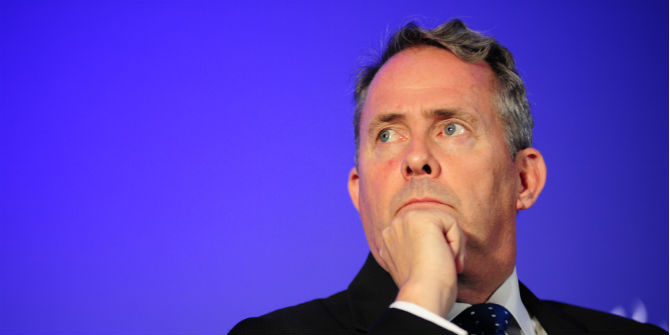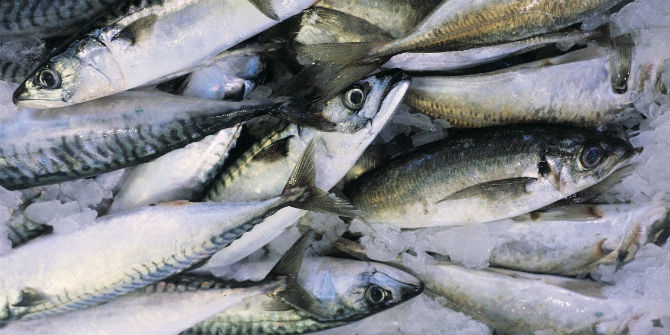 In the last of a series of pieces for LSE Brexit setting out the scale of the challenge ahead as Britain considers how to trade post-Brexit, Michael Johnson explains what Britain’s membership of the World Trade Organisation means for tariffs and market access for services, and why – despite criticism from some hardline Brexiteers – Liam Fox has said that the UK intends to stick as far as possible to the rates which it currently applies under the EU’s WTO tariff schedules.
In the last of a series of pieces for LSE Brexit setting out the scale of the challenge ahead as Britain considers how to trade post-Brexit, Michael Johnson explains what Britain’s membership of the World Trade Organisation means for tariffs and market access for services, and why – despite criticism from some hardline Brexiteers – Liam Fox has said that the UK intends to stick as far as possible to the rates which it currently applies under the EU’s WTO tariff schedules.
WTO membership and schedules of commitments

The UK, like all the other EU states, is a member of the World Trade Organisation in its own right, and not by virtue of its EU membership. The EU negotiates in the WTO as a single unit, but that is by convention, which is respected by the other WTO members, based on its internal legal obligations under the Common Commercial Policy (CCP). Following Brexit the UK will therefore be entirely free to adopt its own import tariffs and other requirements related to the import of goods.
Like all WTO members Britain will have to submit:
- schedules of its import tariffs and other trade restrictions on goods. These must be set out according to the 97 chapters and 5,000+ product headings and subheadings in the World Customs Organisation’s Harmonised Commodity Description and Coding System (known as the “Harmonised System” or HS), according to which 98% of world trade is classified; and additionally
- schedules of market access commitments for foreign service suppliers, according to the requirements of the WTO General Agreement on Trade in Services (GATS).
Formulation of entirely new UK tariff schedules for goods would require detailed economic analysis HS heading by HS heading, as well as consultation with every sector of the economy, even where the intention might be to apply no tariffs or other market access restrictions. The WTO has developed, and oversees, a complex structure of agreements for the conduct of trade between its members, but fundamentally it is still a forum for bilateral negotiations between its 164 member countries. Some trading partners, certainly the major ones, would require the UK to consult with them individually on these schedules and possibly to negotiate on individual tariff rates and other trade issues of concern to them. This would be a massive undertaking that would take years.
Maximum tariff rates set out in WTO members’ HS-based tariff schedules are “bound”, meaning that they cannot be increased. If they are increased above the bound levels, WTO partners whose trade may be adversely affected have the right to demand balancing compensation in the form of trade concessions in other sectors of interest to them. (NB: It is open to any WTO member to charge any tariff at a rate below a bound level, or to waive a charge entirely – called “zero-rating”. Such reductions are always welcomed as the fundamental objective of the WTO is to reduce and remove restrictions on trade.)
Under GATS, members decide at their own discretion what market access commitments for services to inscribe in their schedules but once they have done so those commitments are bound. If due notice is given to the WTO, a commitment may be withdrawn or reduced, but in this case also another member whose traders are adversely affected by the change can demand to negotiate for balancing compensation or, failing agreement on that, can request arbitration. The GATS requires that in such cases the overall level of market protection should not be increased. If the UK proposed to adopt new services schedules which reduced current levels of market access, many WTO partner countries would have the right to demand consultations and possible negotiations.
UK WTO schedules post-Brexit
The only practical course for the UK is, at the point of Brexit, to submit to the WTO national schedules that replicate the EU’s current tariff and GATS access schedules. These embody the commitments that Britain has undertaken as an EU member state. New schedules prepared on this basis should be fairly readily accepted by the WTO as representing no essential change in the UK’s position. If however the UK were to give in to protectionist pressures from this or that industrial sector to increase a current tariff rate above the level which it has bound in the WTO, or to reduce market access rights for foreign service providers, that could give rise to protracted negotiations with other WTO members whose trade would be adversely affected and who as explained above would have the right to demand to negotiate for compensation.
The Secretary of State for International Trade, Liam Fox, announced on December 5 that at the point of Brexit the UK intends to submit to the WTO schedules which replicate as far as possible its current obligations as an EU member state. This announcement was denounced in some quarters as a climbdown by the UK government from its aim of establishing an independent trade policy. In fact it was the only practicable course of action, to avoid what could otherwise be a cripplingly difficult task for UK trade officials and negotiators extending over many years and involving years of uncertainty for both UK and foreign traders.
New UK trade agreements
Government ministers stress the freedom which the UK will recover, once outside the EU, to negotiate bilateral trade deals with any other country. Britain cannot negotiate formally and sign agreements in its own right until it is no longer bound by the EU’s CCP, i.e. until after Brexit has happened. In any case international trading partners would be most unlikely to sign an agreement with the UK, prior to Brexit, which they knew that under EU law Britain had no legal right to make.
Nevertheless informal consultations and soundings between trade officials of the UK and of other countries that are willing to engage in them can be pursued pending withdrawal from the EU, as indeed they already are carried on in the normal course of conducting national and international trade policy.
When it comes to formal trade negotiations, the UK will depend upon the willingness of other chosen partners to devote to them the considerable time and both human and financial resources required. International negotiation is neither cheap nor easy, given the need for all parties to consult widely in the process of establishing national priorities and then to report back to domestic stakeholders as negotiations proceed.
In some cases where a country already has an agreement with the EU, the effort required could be merely for the purpose of renegotiating with the UK benefits which Britain already enjoys as an EU member state. Potential negotiating partners would therefore be bound to scrutinise very closely the possible benefits which either a new or a renewed agreement with the UK could offer them in the British market, before deciding whether it would be worthwhile for them to negotiate. For example the Australian trade minister made clear in a recent interview on BBC Radio 4 that Australia’s priority is to pursue negotiations with the EU for a trade agreement which were launched in 2015, not to negotiate individually with the UK.
A further case in point, currently much discussed, concerns relations with the United States. The negotiations for a major Transatlantic Trade and Investment Partnership (“TTIP”) between the EU and US, which were launched formally in June 2013, have run into serious objections from interest groups and civil society organisations on both sides of the Atlantic. They can probably proceed no further, especially as president-elect Trump currently shows more interest in protecting American industry from international competition than in new market-opening agreements. Trump has made politically favourable noises to the UK about the possibility of negotiating a bilateral trade agreement which could give the UK a more advantageous position in the American market than the EU as a whole currently enjoys, but there is no indication of when, or whether, such indications would be made good in the event. The US side would certainly demand major concessions in the British market in return, for example as regards rights of supply to the National Health Service, and the process would not be quick or easy.
This post represents the views of the author and not those of the Brexit blog, nor the LSE.
This is the third of a series of three posts by Michael Johnson. Read the first two below.
Michael Johnson is a former trade negotiator for the UK government and advises on international trade policy.
Brexit, tariffs and trade, part two: No Single Market membership without compromise
Brexit, tariffs and trade, part one: talk of ‘soft’ and ‘hard’ Brexits is misleading







1 Comments